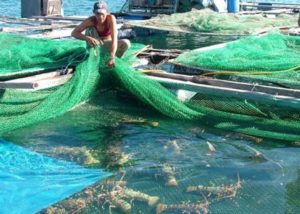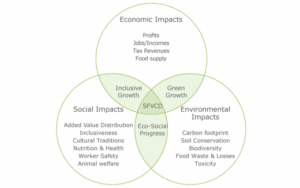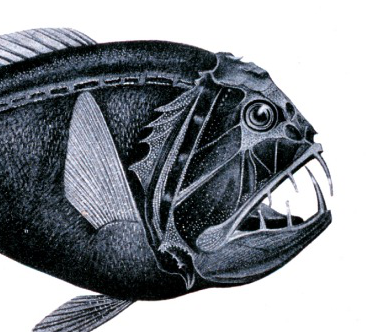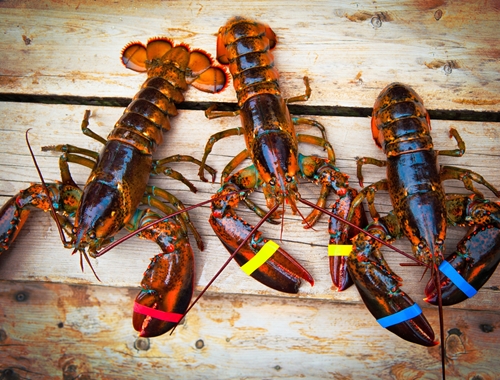Hai, Au Ton Nu, and Stijn Speelman. “Economic-environmental trade-offs in marine aquaculture: The case of lobster farming in Vietnam.” Aquaculture 516 (2020): 734593.
Lobsters provide an important source of income for many people in Vietnam. However, the current aquaculture, or seafood farming, practices are both environmentally and economically inefficient. Is it possible to fish and raise lobster in a way that improves both the environment and the local economy? While many scientists and fishery managers are experimenting with ways to improve regional and global aquaculture, much collaboration is needed to bridge the gap between the environment and the economy. The authors of this recent paper present novel ideas for aquaculture that could provide a win for both.

Lobster Farming in Vietnam:
Vietnam has an extensive coastline, and aquaculture is an important source of income for many coastal communities. In recent years, lobster cage farming has significantly increased, which has placed stress on both the communities and the marine environment on which they depend. Due to increased production, fishers often use more antibiotics and medicine to keep lobsters alive for longer. While saving some lobsters in the short term, it actually increases the risk of disease outbreaks and lobster mortality. On land, similar problems exist with livestock CAFOs, or concentrated animal feeding operations. At the lobster farms studied, workers also tend to overuse feed, leading to excessive nutrients in the water from lobster waste. This increases the risk of eutrophication, and loss of oxygen in the water, which often leads to the collapse of the ecosystem. Both issues contribute to decreased economic and environmental efficiency, posing significant issues for continued development in the region. After performing a literature review and examining several lobster farms, the authors concluded that a “positive economic-environmental trade-off,” or a win-win situation, was possible by employing a strategy that would optimize costs while minimizing impacts on the environment.

Trade-off, Efficiency and Principles, Oh My!
For a long time, the environment and the economy were believed to have a conflicting relationship. The trade-offs involved with making decisions often benefited one while hurting the other. Recently, researchers, policy makers and environmental managers have looked for ways to manage the environment and the economy in a way that minimizes the trade-offs involved, or even a way that benefits both. In order to find the optimal conditions for lobster cage farming, the authors used two methods to perform a complicated analysis on environmental and economic efficiency in Vietnam: Material balance Principle (MBP) and Data Envelopment Analysis (DEA). Combined, these methods allowed the authors to observe the relationship between economic viability and environmental impacts. The MBP looks at the inputs and outputs of a system to estimate the mass conversion taking place. Essentially, “what goes in must come out.” However, using this approach alone would result in an inaccurate representation of the current aquaculture practices, since it does not fully incorporate environmental inputs and outputs into the analysis. To remedy this, the authors also considered the DEA. The DEA approach focuses on making the inputs both cost efficient and environmentally efficient. Using a lot of fancy economic equations, they were able to construct a model that explored efficiency based on the main inputs (lobsters, feed and labor) and outputs (lobster produced).
The Results:
The analysis revealed a complex relationship between the economy and the environment but also some promising results. First, the researchers found that shifting from the current management strategy to either an economically efficient or environmentally efficient strategy would have a positive impact on both sectors. Based on the results, they estimated that the cost of producing lobster would decrease and the amount of nutrients entering the ecosystem would also go down. However, another dimension emerged when they considered switching between an environmentally efficient strategy to an economically efficient one, or vice versa. If a farm had already committed to either strategy, switching to the other could result in negative trade-offs, where one sector benefits and the other is damaged due to decreased optimization. For example, if fishers committed to an environmentally efficient strategy, then decided to switch to the economically efficient one, there would be certain negative impacts on the environment. The authors found that both cost and environmental impacts would be optimized as either strategy was implemented, but the optimization would decrease significantly when shifting to a different strategy. Therefore they recommended committing to a strategy and sticking with it, which would ensure optimal performance for the lobster farms.
Local insights, Global solutions:
The problem facing lobster farms in Vietnam isn’t unique to Southeast Asia. Aquaculture is increasing all over the world, and other regions could face similar problems in the future. The authors are optimistic that the MBP-DEA approach could be used to find more positive trade-offs in other similar situations. They also call for the involvement of local communities and governments in developing these more efficient strategies through training programs and possible regulations. This study illustrates that a win for the environment can also be a win for the economy — something that may pave the way to more sustainable development around the globe.
I recently graduated with a degree in Environmental Earth Science and Sustainability from Miami University of Ohio, and I recently started my MSc at the University of Victoria. While my undergraduate research focused on biogeochemical cycles in lakes and streams, I am excited to pursue my MSc in the El-Sabaawi Lab and explore how urbanization might impact fisheries. In my free time, I love to travel to somewhere off the beaten path, read fantasy novels, try new recipes, and plan my next trip to the ocean.



Hello,
I need to buy live lobster for sales here.Is anyone can advise me? I have big resturaunt in Phuket ,Thailand.
Thank you
Jenny
Does anyone have any idea what a lobster license would cost or where I could find out ? Possibly in Da Nang area.
Thanks.
We can work together!
Hello, we are looking for lobster farms to work with. I wonder what quantity you can provide and when you have a price.
Thanks for the reply.
Sincerely, Artis